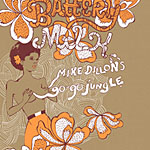Home » Jazz Articles » Extended Analysis » : Spontaneous Music Ensemble: Quintessence
: Spontaneous Music Ensemble: Quintessence
 Spontaneous Music Ensemble
Spontaneous Music EnsembleQuintessence
Emanem
2007
The music on this two-disc set was originally reissued on two separate CDs some ten years ago, and this latest edition adds no additional material. That's of no real concern though, because what's here is one of the seminal recorded documents of free improvisation, played by masters of the medium at a time—the early 1970s—that spawned some extraordinary music.
In the twenty-odd years after the album was recorded, percussionist John Stevens (1940-1994) pursued an exceptionally singular musical path. His work here is both pointillistic and minimal, the product of a process in which the notion of making every note count is taken to a rigorously logical conclusion.
Amongst many other things this is a genre of lightning responses, and the quintet of soprano saxophonists Evan Parker and Trevor Watts, guitarist Derek Bailey, bassist/cellist Kent Carter and Stevens perfectly exemplifies it. The music—caught in a fidelity which, whilst it might not be state-of-the-art, seems somehow to enhance its impact—is also profoundly democratic and subversive of the soloist-with-accompaniment model that has been a cornerstone of less esoteric strands of improvised music.
All of this is especially notable on both parts of "Thirty Five Minutes on the first disc. Here even a basic issue like the volume of the sound seems to be governed by an extraordinary process of mutual consent. Within the context of music that is so profoundly a group product, it's nothing short of extraordinary that the musicians had only done a sound check together prior to the recording.
The second disc is made up of music made at a gig by a trio and a duo culled from the quintet. The trio of Watts, Carter and Stevens stays broadly within the quintet's remit, although Carter's bass occasionally flirts with a relatively grounded, propulsive role. His efforts have the effect of making the music seem less rarefied, though in a way that never distracts from the musicians' extraordinary level of responsiveness and attention to detail.
The music on this second disc was recorded in October 1973, some months prior to that on the first disc, and any contrast between the two highlights the latent malleability of the form. The results are seminal, hinting as they do at music which offers a working definition of freedom, and when "Daa-Oom breaks down after roughly five minutes it seems only to highlight how mercurial that proposition can be.
If some notion of reductionism permeates this music it reaches its logical conclusion in the duo of Watts and Stevens. Watts' work on both "Corsop and a further reading of "Daa-Oom makes the fact that he subsequently turned his back on this area of the music frustrating; his return to it in more recent times after a prolonged absence amounts to the return of a prodigal son. It doesn't alter the fact that the duo's dialogue as it was captured here had reached some unprecedented area of refinement, and the passing of time highlights that.
Viewed overall, this is a release that should appeal to anyone tired of the predictable. It captures an important moment in the individual creative development of each musician, and also an enduring moment in improvised music's development. Deeply compelling.
Tracks and Personnel
CD1: Forty Minutes (Part 1); Forty Minutes (Part 2); Thirty Five Minutes (Part 1); Thirty Five Minutes (Part 2) CD2: Ten Minutes; Rambunctious 1; Rambunctious 2; Daa-Oom (Trio Version); Corsop; Daa-Oom (Duo Version).
Evan Parker: soprano saxophone; Trevor Watts: soprano saxophone; Derek Bailey: guitar, amplified guitar; Kent Carter: bass, cello; John Stevens: percussion, cornet, voice.
Tags
PREVIOUS / NEXT
Support All About Jazz
 All About Jazz has been a pillar of jazz since 1995, championing it as an art form and, more importantly, supporting the musicians who make it. Our enduring commitment has made "AAJ" one of the most culturally important websites of its kind, read by hundreds of thousands of fans, musicians and industry figures every month.
All About Jazz has been a pillar of jazz since 1995, championing it as an art form and, more importantly, supporting the musicians who make it. Our enduring commitment has made "AAJ" one of the most culturally important websites of its kind, read by hundreds of thousands of fans, musicians and industry figures every month.




















